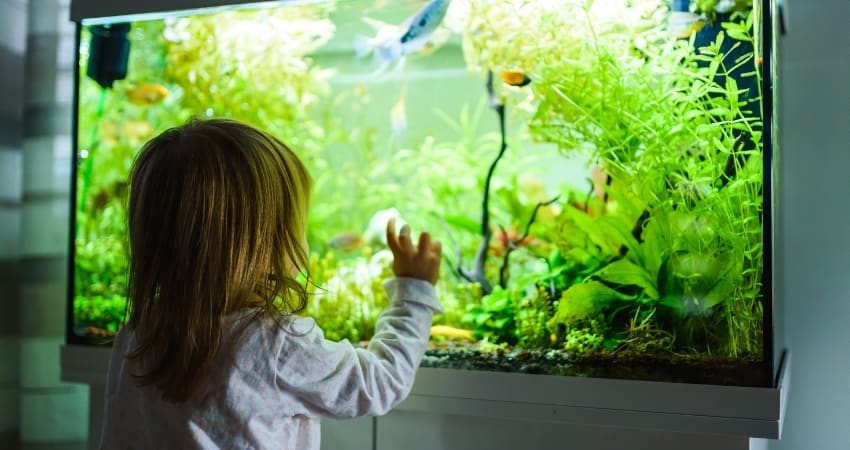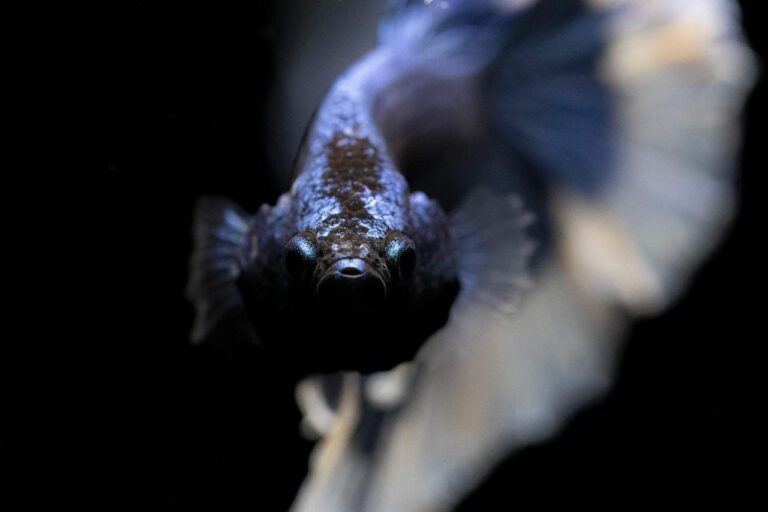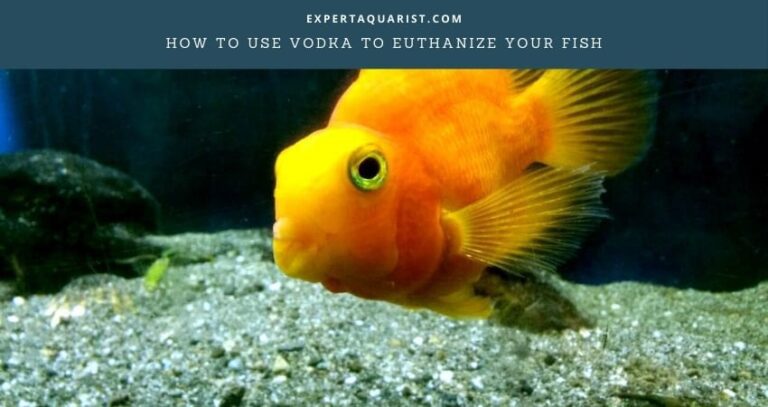Pets, particularly fish, are like our family. They give us an immeasurable amount of joy. But just like the happy memories, there is a wave of sadness when they’re about to die.
It’s hard to know when a fish is ill, and even harder trying to comfort them in its final moments. It’s not easy for us humans either; it feels like we’re helplessly watching someone we love die, but if you know how to comfort a dying fish, maybe you can send them off knowing that they were loved.
Keeping them calm, storing away from direct sunlight, protecting them from other fish, providing a favorable temperature, and feeding good food are some of the kind gestures you can show to your dying friend.
Want to know more? Scroll down for a detailed idea…
11 Things You Can do To Comfort a Dying Fish
Bearing the loss of your pet fish is painful, especially if you have a very close connection with it. While watching them swim gaily over the water may give us thrill or serenity. But eventually, they will die and when it does, you have a responsibility.
Indeed, it is your job to provide your dying fish with the best amenities as it is leaving you.

Here I’ll discuss how to comfort a dying fish when it approaches its last ride. It is important to provide the best final resting place possible for your pet by following these easy steps:
1. Adjust the Water Temperature
The first thing you can do for your dying fish is to adjust the water temperature based on its species. Sounds simple, but for a dying soul, even the smallest comfort is significant.
The temperature of tropical or cold-water fish may differ from warm-water fish. For example, catfish, Bettas, Swordtails, Firemouth Cichlid, Zebra danios, oscar fish or Dwarf Gouramis are one of the kinds of tropical fish. They do their best at 24-27°C or you can count it between 75-80°F.
Whereas cold water fish thrive in lower temperatures compared to tropical water fish. The temperature normally ranges from 60-75°F, on the Celsius scale, it will remain 15-24°C. It does not make any difference if it is from your aquarium, tank, pond, or other water resources.
Throughout the day, different fish species require varying water temperatures. Fish can easily become ill if they are not kept in clean, well-maintained, and appropriate water temperature. It can easily cause fatal injury to your fish.
In short, you need to figure out what is the perfect temperature range for your fish. In addition, do not forget to keep monitoring it. If it is too hot, the dissolved oxygen level may decrease resulting in a quick loss!
Here is a table that represents appropriate water temperature for different species of fishes. Please have a look:
| Fish | Recommended temperature |
| Angelfish | 78-84F |
| Betta | 75-80F |
| Cardinal Tetra | 73-81F |
| Clown Loach | 77-86F |
| Danios | 70-78F |
| Goldfish | 68-74F |
| Guppies | 74-82F |
| Harlequin Rasbora | 72-82F |
| Hatchetfish | 72-81F |
| Minnows | 64-72F |
| Plectostumus | 75-82F |
| Rams | 84-86F |
| Tiger Barb | 77-82F |
| Silver Dollar | 75-82F |
| Zebra | 64-75F |
2. Change the Water on a Regular Basis
Your little buddy may find it troublesome to live in a dirty and noxious place especially if it has reached its last stage. So, try to change your aquarium or tank water regularly.
Sometimes, a variety of different things can influence the quality of water. Such as, it may depend on your water filtration system, whether it is functioning well or not. Ensure that the water’s pH (Potential of Hydrogen) level is between 6.8 to 7.6 but can vary for certain fishes. Maintaining your aquarium’s pH level can provide your fish a very long and pleasant life. Here is a list of pH levels of certain fishes. Let’s take a look to get a quick idea.
| Fish | pH level | |
| Angelfish | 6.5 – 7.0 | |
| Betta | 6.0 – 8.0 | |
| Cardinal Tetra | 4.6 – 6.2 | |
| Clown Loach | 6.0 – 6.5 | |
| Danios | 6.0 – 8.0 | |
| Goldfish | 7.0 – 7.5 | |
| Guppies | 7.0 – 8.5 | |
| Harlequin Rasbora | 6.0 – 6.5 | |
| Hatchetfish | 6.0 – 7.0 | |
| Minnows | 6.0 – 8.0 | |
| Plectostumus | 5.0 -7.0 | |
| Rams | 5.0 – 6.5 | |
| Tiger Barb | 6.0 – 6.5 | |
| Silver Dollar | 6.0 – 7.0 | |
| Zebra | 6.5 – 7.0 |
Here is an important point to be noted. Changing water does not mean that you can use water from any source. Fresh and clean water is highly recommended.
3. Keep Your Fish Away from Direct Sunlight
Direct sunlight is strictly prohibited for fish. It will make the environment vulnerable for them. Even though sunlight can help to keep your fish’s color vibrant. On the flip side of the coin, excessive heat can quickly lead to algae bloom in an aquarium. As a result, the surroundings will be messy.
Always remember! Keeping an aquarium in such a hot place for a long time will make the temperature unbearable for fish.
The result? You may witness a quick death or degrade your fish’s life expectancy. However, if this occurs, replace the setup where the sunlight has no direct effect. Finally, try to make sure that it is having a sufficient amount of light.
4. Create Calm and Safe Surroundings
An ill, dying fish will not have the same energy as a strong, healthy fish. It comes down to the fact that a sick fish will require a more comfy, tranquil, and peaceful environment to relax. Keeping healthy surroundings will help your dying fish to relax appropriately and be calm. It is also making him feel more relaxed and peaceful.
Don’t forget to put the aquarium in a room with little habitants. It is quite pathetic for a dying fish if the room is full of gathering or the surrounding is always noisy.

5. Take Away the Aggressive Fish
This indicates that any particularly dangerous fish should be kept separate from your dying fish. This can be accomplished by temporarily removing the aggressive fish. or placing the dying fish in another tank.
You need to be very careful about the fact that your dying fish is not continuously irritated or harassed by other fish.
6. Make a Special Place
Fish enjoy each other’s company as well. But the circumstance is different here when it comes to dying fish. They prefer spending their final moments in solitude. That does not mean the fish has to be lonely. The solution is simple. A dying fish generally likes to relax in a private area of your pond or a tank.
Make a special area by separating it from other fish. You can also place it in a new tank with a new environment. It will make them a little bit active and curious before dying.
7. Take Vet’s Help
When your fish is about to die, the majority of its body does not function properly. Consulting with a vet is a big help here. Feed your poor fish according to the vet’s prescription. Reset the food menu and reschedule the feeding time as the vet says.
8. Feeding Separately
Sadly, dying fish don’t have the body strength as other fishes have. Every time you feed the fish you see competition among them. With a sick body, winning this competition becomes too hard for the poor little fish. It leads it to die faster. Put the fish in a different tank and feed it there.
9. Make Plenty of Resting Areas
It is quite normal that your dying fish will take a rest or sleep most of their time. Before dying, their activities will be shortened. So, make the surface full of silky and smooth aquatic plants or grasses.
All together, try to make a better place or surrounding where it can simply pass its final time without any disturbance until the time has come!
10. Keep Other Fishes Safe
If any fish dies (Let’s hope it not), take the body away from other fish. Its rotten body may cause diseases to other fish. Necessary precautions should be taken if the dead fish had a contagious disease. You should put the fish in a different tank to prevent the spreading.
11. Put Them Out of Their Misery
At some point, you feel clueless and out of options. The only thing you may want to do is reduce the pain of your dying fish by killing it. But sometimes you need enough strength to do it.
Therefore, you have just one option left for you, called ‘Euthanasia’. This is the most gentle, humane, and painless method of quickly putting an end to your fish’s life.
You can accomplish it in a variety of ways. Freezing, taking it from the water, snapping the neck on the surface, and slicing the head off are a few examples of Old School methods. However, these outdated methods no longer appear humane.
Overdosing on medication, according to specialists, can cause them to pass away peacefully. Benzocaine Hydrochloride, Tricaine Methanesulfonate (TMS), and Vodka Technique/Clove oil are some of the anesthetic drugs that will help you to put them out of their misery. Read about more here

How do you know when a fish is dying?
Closely observe the condition of your fish. Compare its movements with other fishes. Normally, all they do is swim. If it’s not swimming it means something is wrong. You will see it sitting down at one corner of the tank.
Another sign of their dying time is consuming less food or no food at all. Fishes tend to compete with each other when they get to eat. In this case, you will see your poor fish not being a part of this competition. These are clear indications that your fish has its end-time coming.
Mourning The Loss Of A Fish
Saying ‘Goodbye’ to your loved one has never been easy for anybody, it won’t be. But this unwanted truth happens to everyone. Bidding a nice farewell or saying a proper goodbye always helps a pet lover to comfort his/her grief. Tossing your dead fish in the trash or throwing it into the toilet is not helpful really. Bury it in a fine place where you can visit it sometime.
Take an old picture of your friend, embellish it with a nice frame and place it close to your bed. Keep its memory evergreen in your heart. It is OK to cry sometimes. Let your tears go, talk to someone who can console you in this dull situation.
Join a pet lover group, only they can understand what you are going through. Especially, avoid non-pet-lover people who may start making jokes out of your emotions. Their harsh comments will torment your inner feelings.
Last thoughts
Nevertheless, you know time can heal everything. Your grief will gradually heal as time passes.
Instead of being lonely or depressed, try to do something unique and memorable to accompany the last ride with your dying fish.
Undoubtedly, you have a kind personality because you are concerned about your dying Fish. Such empathy is lost nowadays.
Finally, I know it is quite tough but I strongly believe knowing how to comfort a dying fish will give your loved friend a sweet farewell.





